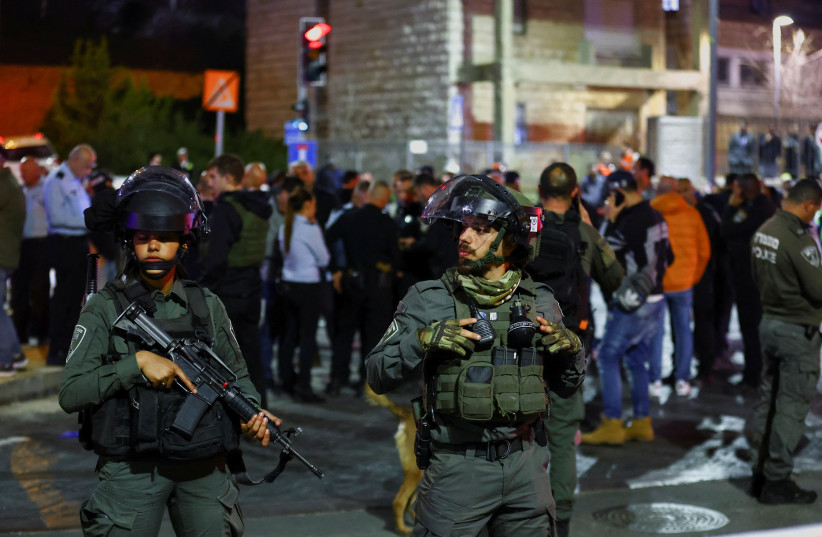Legal reform can improve Israel’s counterterrorism effectiveness. Even if Attorney-General Gali Baharav-Miara was an expert in criminal law or the laws of armed conflict, which she is not, there should be no obligation to ask for her approval on basic counterterrorism measures, such as house demolitions in response to the recent terrorist attack that slayed seven Israeli citizens near a Jerusalem synagogue and in an effort to prevent similar attacks in the future.
Under the circumstances of this recent attack, the immediate expulsion of the terrorist’s father who facilitated the attack is also called for.
This callous murder of innocent worshipers was not the first and will probably not be the last terrorist attack by Palestinians against Israeli civilians. It’s a centuries-old phenomenon. But it is not something that should merely be contained, it is something that should be confronted. Not only because our blood is boiling with anger, but because we owe it to the victims and to ourselves to find the most effective means to confront and prevent future acts of terror.
Counterterrorism: Where clarity and consistency is more critical than ever
Nowhere is clarity and consistency more critical than in counterterrorism. While it may be argued that terrorists have human rights, their victims and potential victims have such rights, too.
Over the years, many counterterrorism cases have been addressed by Israel’s High Court of Justice (HCJ). In a notable 2002 case, the HCJ, led by Aharon Barak, unanimously approved the expulsions of Intissar and Kipah Ajouri, the sister and brother of Ali Ajouri, convicted of launching suicide bombings. The Court was convinced that Intissar and Kipah were involved in terrorism and that they presented a danger that could be averted if they were removed from their place of residence in Judea to Gaza.

The law should be equally applicable to residents within Israel proper, who incite or actively support Palestinian terrorist attacks under similar circumstances. If the terrorists and facilitators in question have residency status, their status should be revoked and they should be deported. In case of citizenship, they should be incarcerated within the state. Their imminent threat to public safety is clear and their place is certainly not in Israel.
In other notable counterterrorism cases, the HCJ examined the legality of using physical pressure during terror-related interrogations (HCJ 5100/94), the placement of the security fence to prevent access of suicide bombers seeking to infiltrate Israeli city centers (HCJ 2056/04), the use of civilians as a means of early warnings of a terrorist attack (HCJ 3799/02) and the permissibility of targeted killing (HCJ 769/02).
Whether it is justifiable for a court to make rulings on all these cases or not is debatable. It is questionable, for example, whether former chief justice Dorit Beinish or any other chief justice should have had the authority to decide where to place a security fence designed to prevent the infiltration of suicide bombers into Israel. But the fact is that there is a legal toolbox that could have been used in this and other cases.
TIME IS often of the essence when confronting terrorism. In times of conflict and crisis, elected officials and commanders should not need to ask the attorney-general for preapproval for every response, certainly not those counterterrorism responses that have already been litigated or legislated and are not life-threatening. Commanders and elected leaders should be able to implement the said measures based on basic guidelines.
Expelling facilitators from within the terrorist’s family is assessed to help prevent future attacks. It also makes the terrorist organizations’ objectives harder to achieve. Recruiting terrorists to Hamas and PLO is harder when the recruits know their supporting family may benefit from PA paychecks but will also pay a significant price for their involvement in terrorism.
Not every countermeasure needs to be taken immediately after an attack but some are most effective when they are. It is up to security officials to assess the effectiveness and timing of such measures and the elected officials’ role to authorize or disallow them.
Palestinian terrorists should know that there is a high probability that any murderous attack will result in the attacker’s loss of life, the destruction of his home and the expulsion of his supportive family.
Israel needs to be proactive and preemptive again. It needs to take non-life-threatening action (i.e. house demolitions and deportations) immediately after an attack of the kind seen at the Jerusalem synagogue.
The home that housed Alqam Kheiri, who murdered seven Israelis in Neveh Ya’acov, should be demolished and his father, Musa Kheiri, who praised the slaughter and took credit for educating his son to act in such a murderous manner, should be deported.
Seven families just sat Shiva in mourning their murdered loved ones and Musa Kheiri can still be found salivating over shawarma in Shuafat and inciting others to follow in his son’s footsteps. In what world can this be considered reasonable?
“At times, democracy fights with one hand tied behind her back. Despite that, democracy has the upper hand, since preserving the rule of law and the recognition of individual liberties constitute important components of her security. At the end of the day, they strengthen her and her spirit, and allow her to overcome her difficulties.”
Aharon Barak
In his final judgment, former chief justice Aharon Barak reiterated that “At times, democracy fights with one hand tied behind her back. Despite that, democracy has the upper hand, since preserving the rule of law and the recognition of individual liberties constitute important components of her security. At the end of the day, they strengthen her and her spirit, and allow her to overcome her difficulties.”
Barak’s reflection may have merit but Israel should not be bound to fight with two hands tied behind its back. Legal reform can improve counterterrorism effectiveness.
The writer is an author, most recently of Targeted Killing, Law and Counter-Terrorism Effectiveness, a research fellow at the Institute for Counter-Terrorism (ICT) and the CEO of Acumen Risk Ltd.
